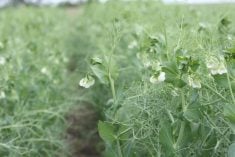Canada is one of the few regions of the world where crop yields will benefit from global warming, according to a recently published Agriculture Canada research paper.
The benefits will be particularly pronounced for prairie crops like canola and wheat versus Ontario corn.
Yields were simulated by three crop modelling systems using 20 global climate models under different warming scenarios. It is the first study of its kind for Canada.
The four warming scenarios were increases of 1.5 C, 2.0 C, 2.5 C and 3.0 C over the baseline climate of 2006-2015.
Read Also

New program aims to support plant-based exports to Asia
Understanding the preferences of consumers in Taiwan and how they differ from Indonesia or Malaysia isn’t easy for a small company in Saskatchewan.
“The findings indicate that climate at the global warming levels up to 3 C above the (baseline) could be beneficial for crop production of small grains in Canada,” stated the study published in the July 1, 2019, edition of Environmental Research Letters.
That is counter to what is expected to happen throughout much of the rest of the world, especially tropical climates.
Climate change has already caused an estimated 40 million-tonne reduction in world corn, wheat and barley production between 1981 and 2008. That represents a two-to-three percent hit to global production of those three crops.
Global warming is projected to be far more intense in Canada than the rest of the world. Canada’s mean air surface temperature has warmed by 1.8 C between 1950 and 2016, which is about double the global mean temperature increase.
Canada’s warming rate is projected to continue at a faster pace than the global rate due to polar amplification. That is important since heat stress can reduce crop yields.
However, there is another factor at work that is expected to more than offset the yield losses associated with heat stress in the years to come.
“Due to elevated atmospheric carbon dioxide concentration, C3 crops like canola and wheat can have more effective carbon dioxide responses to carbon assimilation than C4 crops such as corn,” study lead author Budong Qian said in an email.
Research has shown the doubling of carbon dioxide concentration increases yields in C3 crops by about 30 percent, while there was effectively no response in C4 crops.
Agriculture Canada’s findings are consistent with previous studies that have shown the largest yield gains will occur in water-stressed regions such as the Canadian Prairies due to improved water-use efficiency with elevated carbon dioxide levels.
Global warming is also expected to boost growing season precipitation levels by about five percent on the Prairies at warming levels of 2 C and 2.5 C, while a slight decrease in precipitation is forecast for Eastern Canada.
“Since the Prairie region is relatively cooler than Eastern Canada and water stress is the major factor limiting the canola and wheat yields, a bigger yield percent change was projected (for the Prairies),” said Qian.
The Agriculture Canada study shows an increase in canola and wheat yields for all four global warming scenarios under all three models.
The highest canola yield increase is 13.4 percent under the 3 C warming level. The biggest wheat yield bump is 22.8 percent under the same warming scenario.
Corn yields vary widely from yield reductions under every warming level for one model to a 19 percent increase under the 3 C scenario for another model.
The projections are based on current crop cultivars. The introduction of extended growing season corn varieties could vastly improve the outlook for corn yields.
Qian said weed and pest pressure might increase with global warming but that wasn’t factored into the crop models. It also didn’t take into account yield damage caused by increased drought, hail and flood events.


















